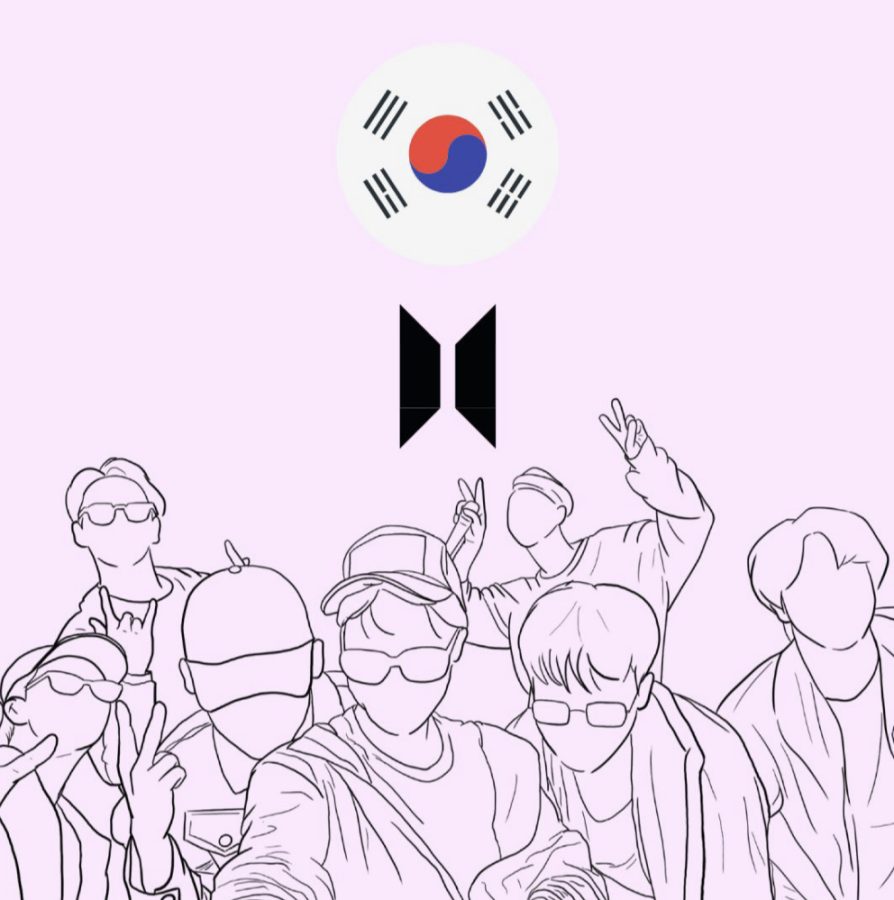Nearing the 10th anniversary of their debut, BTS has created history, leaving a permanent mark on the global music scene. While there is no single way to describe BTS’s impact, K-pop trailblazers, self-love advocates and diversity empowerment all result from their influence.
Now a common household name, BTS is a band of “firsts”: the first Asian act to top Billboard 200, the first Korean act to sit at #1 on Billboard Hot 100, the first and only Asian act to win “Artist of the Year” at the American Music Awards and the first K-pop group to be nominated in one of the top four categories at the Grammys. Most recently, BTS’s Jimin became the first Korean artist to top the Billboard Hot 100.
Senior Aarya Joshi has been a fan of BTS since 2021, witnessing the rise in their popularity and influence firsthand. “Ever since BTS made it big in the western entertainment industry, many aspects of Korean culture have increased in interest and popularity. BTS is fueling tourism, fashion, skincare and much more,” she said. “After becoming a BTS fan, I took an interest in K-dramas and Korean movies.”
Because of BTS’s global influence and fame, K-pop as a whole has grown to become a global phenomenon. Lee Gyu-tag, an associate professor at George Mason University Korea, has studied the globalization of K-pop and credits BTS for the genre phenomenon. “The biggest influence of BTS is that they increased K-pop’s dependency on the overseas market and made it truly a part of the global popular music market,” he said.
However, despite K-pop’s seemingly expanding popularity, there are worries that the entire industry is on a negative slope due to BTS’s military enlistment.
On Oct. 17, 2022, the group’s agency announced that all seven members will complete South Korea’s mandatory military service. The agency said that BTS will reconvene as a group in 2025, but until then will focus on their military enlistments and solo music endeavors.
Bang Si-hyuk, the man behind the creation of BTS, recognizes that K-pop’s growth has slowed or turned negative in some markets. Bang believes that BTS’s hiatus as a group is a main reason behind this trend. Though K-pop album sales have had a 4.8% growth in sales since 2021, the percentage dwarfs in comparison to previous years’ growth — 62.1% in 2021 and 82.6% in 2020.
Junior Rupika Jai Ganesh, an avid BTS fan, has seen a lot of information about their economic impacts. “My TikTok and Instagram account has a lot of information about BTS contributing to South Korea’s economy; this is incredible considering that they’re just one band among the many in South Korea,” she said. “Their global reach and popularity has allowed them to be one of the most revenue generating groups in SK—and maybe even the world. There is a reason people draw parallels between the patterns of both Beatlemania and ARMY.”
Beyond the musical crisis, BTS’s significant economic contributions have raised concerns regarding the South Korean economy, with worries being raised that BTS’s military enlistment will negatively impact the South Korean economy.
BTS had an unexpected yet extremely influential impact on the South Korean economy. BTS’s popularity fuels interest in learning the Korean language, viewership of Korean movies and tourism in South Korea—one in every 13 tourists traveling to South Korea visit because of BTS.
Recent numbers value the total contribution of BTS to South Korea’s economy as 5 billion USD, equivalent to half a percent of the country’s entire economy. Since debuting in 2013, BTS has contributed 29.4 billion USD to South Korea’s economy.
Directly following the military enlistment announcement was a drop in BTS’s management company shares by nearly one quarter, which was the lowest stocks had been since the company went public in 2020. It is predicted that BTS’s absence, albeit brief, will result in a loss of billions of dollars for South Korea.
“BTS generates more than the rest of active K-pop groups combined,” Joshi continued. “Their contribution to the Korean economy is irreplaceable. To some degree, the Korean economy is going to take a big hit once all BTS members have enlisted in the military.”
While only time will reveal the lasting economic and musical impacts that BTS’s military enlistment will have on South Korea, the concerns that their absence will result in irrevocable changes is an exaggeration. Bands like Blackpink and Mamamoo are embarking on world tours while Tomorrow x Together made history by becoming the first K-pop group to headline Lollapalooza. By nominal GDP, South Korea has the 4th largest economy in Asia and the 13th largest in the world.
All that can be done now is await the return of “The Princes of K-Pop and Global Pop.”
It is as Lee Key-cheol, the Executive Director Of UNICEF Korea, said, “South Korea has made two major achievements for the last 60 years. The first one was its democracy and economic development, and the second one was producing BTS.”










